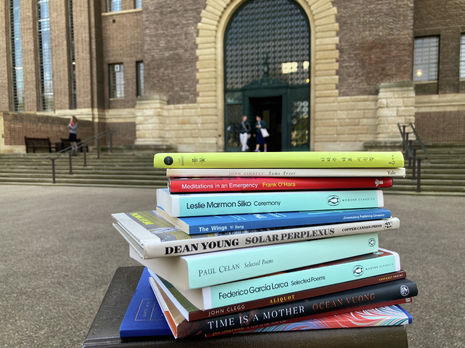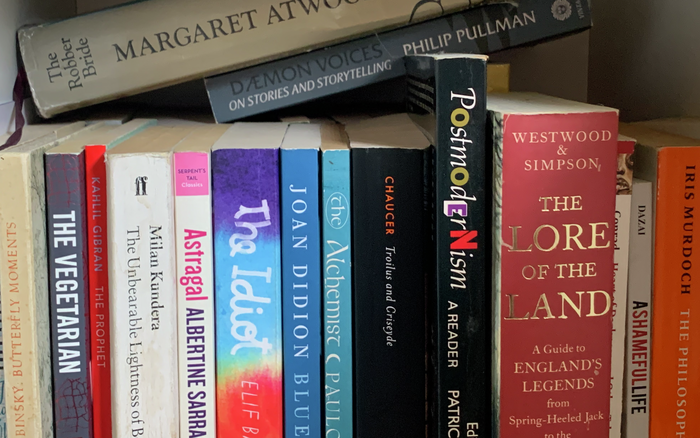A reading list to escape from exam term
From a surrealist poem about ice cream and communism to a novel that “could be described as The Secret History on magic mushrooms”, here are the Arts team’s top picks to transport you anywhere other than an exam hall

The Pursuit of Love by Nancy Mitford – Grace (Arts Editor)
Hilarious. Eccentric. Escapist.
This brilliantly colourful, bitingly witty and painfully tender tale follows the dramatic turns of fate in the wild, frivolous life of Linda Radlett and her bizarre aristocratic family through her cousin’s fond observations. Energised with the vibrancy of the Bright Young Things of the ’20s, it’s the perfect indulgent novel to escape into when revision gets a little too dull.
“Eating Chocolate Ice Cream, Reading Mayakovsky” by Barbara Guest – Leo (Arts Editor)
Magical. Violent. Eggs.
If you’re looking for a slice of escapism, this poem is all about our ability to imagine. Guest casts strange dreams over breakfast, shifting ice cream and eggs into rifles and the Red Army. Have a listen to the recording of her reading it, if you can – she has a beautiful Transatlantic drawl that makes my brain feel freshly buttered.
Falling Awake by Alice Oswald – Ahana (Arts Writer)
Contemplative. Beautiful. Profound.
Alice Oswald’s Falling Awake is a collection of poetry I’ve always returned to come April. The poems are ambitious in scope; she magnifies small moments in nature with hideous, heartbreaking intensity. But Oswald’s worldscape is anything but chaotic – the poems are clean and sparsely structured, making them accessible and perfect for Easter reading.
“she magnifies small moments in nature with hideous, heartbreaking intensity”
The Bell Jar by Sylvia Plath – Katie-Mia (Arts Writer)
Psychological. Ominous. Cynical.
Set in the summer of 1953, The Bell Jar follows Esther Greenwood’s mental decline as an aspiring poet, powerfully exploring the concepts of social acceptability, identity and mental health.
Heartburn by Nora Ephron – Loveday (Arts Writer)
Witty. Heartfelt. Bittersweet.
Nora Ephron (writer of When Harry Met Sally) enchants with her easy conversational tone and quick wit. The narrator of Heartburn is Rachel – a food writer and thin veil for the author herself – who intersperses her recipes with thoughts from her life and marriage with a delicious ease that makes you want to devour the novel in a single sitting.
I’m Not Stiller by Max Frisch – Anna (Arts Writer)
Uncanny. Heroic. Swiss.
A man is arrested and accused of being the sculptor Anatole Stiller, who has been missing for six years. The man vehemently refuses this identity, even at the cost of his freedom. Truth is a contested space and the self is chimerical. A novel for those who compulsively read obituaries over breakfast.
Bunny by Mona Awad – Miranda (Arts Writer)
Satire. Psychological. Feminist.
Prepare to be both charmed and disturbed by what could be described as The Secret History on magic mushrooms. Following outsider Samantha Mackey as she’s drawn into a clique of girls dubbed “the Bunnies”, Awad explores the intensities of female friendship and the desire to belong. Her glittering, evocative prose blurs the mundane with the magical in this electric, surreal and deeply feminine tale.
The Mays 31 – Toby (Arts Writer)
Fresh. Diverse. Student-written.
If you’re looking for a book to dip in and out of, or read aesthetically in Grantchester Meadows, then The Mays is for you! It’s full of the best short stories, poetry and artwork by students at Cambridge and Oxford – and it has a wonderful cover that looks great on a bookshelf.
“A novel for those who compulsively read obituaries over breakfast”
The Letters of Vincent Van Gogh – Eva (Arts Writer)
Scenic. Charming. Slice-of-life.
Escape into the mind of a beloved yet misunderstood painter as you flip the pages of this book and uncover snapshots of his life. The mix of ennui, evocative imagery and sublime personal philosophy makes this a calming but fascinating read.
Maurice by E.M. Forster – Sasha (Arts Writer)
Sentimental. Nostalgic. Heartfelt.
Feel like reading a classic but don’t know where to start? Look no further than E.M. Forster’s Maurice. Set in Cambridge, this raw and romanticised short book follows a blossoming queer relationship between two university students. It’s sentimental, nostalgic and heart-breaking – and has a ’90s Hugh Grant film to accompany it!
“Chanson des Etages” by René Char – Dion (Arts Writer)
Quiet. Melancholy. Bittersweet.
“Chanson des Etages” (“Song of the Stairs”) is a short poem about a king and queen in the quiet hours of night. There’s a sensation to reading it which reminds me of melancholy evenings in summer. With so much contained within its multiple layers, this is a poem that will keep you thinking for a while.
The Prodigy by Hans Giebenrath – Eve (Arts Writer)
Gifted. Kid. Burnout.
While readers heading into exams may hope for a better outcome than befalls Hans Giebenrath, The Prodigy (originally titled Beneath the Wheel) is a pertinent critique of performance-obsessed schooling – one that nevertheless encompasses a sense of warmer weather, cider-pressing, and the weirdness of young poets.
Klara and the Sun by Kazuo Ishiguro – Lisa (Arts Writer)
Gentle. Warm. Bittersweet.
I’ve been (re-)reading Kazuo Ishiguro’s Klara and the Sun over the holidays. Sometimes it’s nice to have some familiarity in a book, and Klara’s narration is as familiar and comforting as if I myself were her child. Perfect for taking on a walk to Grantchester as the taste of spring grows stronger.
 Comment / Cambridge is right to scrap its state school target1 May 2024
Comment / Cambridge is right to scrap its state school target1 May 2024 News / Academics call for Cambridge to drop investigation into ‘race realist’ fellow2 May 2024
News / Academics call for Cambridge to drop investigation into ‘race realist’ fellow2 May 2024 News / Gender attainment gap to be excluded from Cambridge access report3 May 2024
News / Gender attainment gap to be excluded from Cambridge access report3 May 2024 News / Cambridge postgrad re-elected as City councillor4 May 2024
News / Cambridge postgrad re-elected as City councillor4 May 2024 Comment / Accepting black people into Cambridge is not an act of discrimination3 May 2024
Comment / Accepting black people into Cambridge is not an act of discrimination3 May 2024





